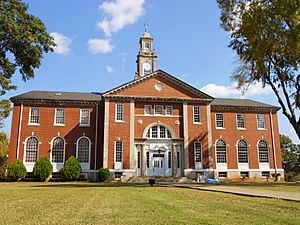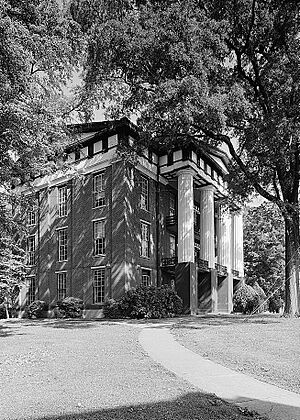Talladega College facts for kids

Savery Library
|
|
|
Former names
|
Swayne School (1867–1869) |
|---|---|
| Motto | An Education of Distinction |
| Type | Private historically black college |
| Established | 1867 |
|
Religious affiliation
|
United Church of Christ |
| President | Willie L. Todd |
| Students | 1,307 (fall 2020) |
| Location |
,
,
United States
33°25′56″N 86°6′47″W / 33.43222°N 86.11306°W |
| Campus | Rural 50 acres (20.2 ha) main campus |
| Colors | Crimson & Sky Blue |
| Nickname | Tornadoes |
|
Sporting affiliations
|
NAIA – HBCUAC |
| Mascot | Dear Ole' Dega, Dega, TC |
| Website | www.talladega.edu |
Talladega College is a private college in Talladega, Alabama. It is known as a historically black college (HBCU). This means it was founded to provide education for African American students. It is the oldest private HBCU in Alabama. The college offers 17 different study programs. It is officially recognized by the Southern Association of Colleges and Schools.
Contents
The Story of Talladega College
The idea for Talladega College started on November 20, 1866. Two formerly enslaved men, William Savery and Thomas Tarrant, met in Mobile, Alabama. They were part of a meeting for newly freed people. They strongly believed that education was key for their children's freedom. They also felt that true religion was important for good values.
Savery, Tarrant, and another freed man, Ambrose Headen, worked hard. They wanted to create a school for children of former enslaved people. They built a one-room schoolhouse from old wood. The school quickly became too small because so many students wanted to learn.
Around the same time, a building called Coosa River Valley Baptist Academy was going to be sold. This building was special because Savery, Tarrant, and Headen had helped build it while they were enslaved. A request was sent to General Swayne to buy the building. Major General Wager Swayne helped the Freedmen's Bureau buy the land. The American Missionary Association (AMA) bought the building.
From Swayne School to Talladega College
The AMA renamed the school The Swayne School. It opened in November 1867 with about 140 students. It was amazing that a building built by enslaved people for white students became a college for Black students. In 1869, the school officially became Talladega College. This was approved by the local county judge.
The old Coosa Valley Baptist Academy building is now called Swayne Hall. It is a symbol of the college's beginnings.
Exploring the Campus
Talladega College is located in the city of Talladega. The campus covers about 50 acres. It has 17 main buildings. Many of these buildings are listed on the National Register of Historic Places. This means they are important historical sites.

Important Campus Buildings
- Savery Library: This library was finished in 1939. It holds many books and magazines. It also has a computer lab and a special Archives Room. Inside, you can see the famous Amistad murals painted by Hale Woodruff. These murals tell the story of enslaved people who fought for their freedom. There's also a mural of La Amistad on the floor. College tradition says you should never step on it. The library also has a collection of artifacts from Angola and Nigeria.
- Andrews Hall: Built in 1910, this building is home to the Music and Education Departments. It is named after George Whitfield Andrews, who was a dean at the college.
- Arthur D. Shores Hall: This building was built in 1974. It is named after Arthur D. Shores, a lawyer and former chairman of the college's Board of Trustees.
- De Forest Chapel: This chapel was built in 1903. It honors Henry Swift De Forest, who was president of the college. The chapel was updated in 1996.
- Dr. William R. Harvey Museum of Art: This art museum opened in 2020. Its most famous pieces are the Mutiny on the Amistad murals by Hale Woodruff.
- Fanning Refectory: Built in 1928, this building has the dining rooms for students and teachers.
- Juliette Derricotte House: This house was built in 1940–41. It is named after Juliette Derricotte, a former student and trustee. It used to be a guest house but became a women's honors dorm in 1988.
- Silsby Science Hall: Constructed in 1926, this building is named after E. C. Silsby, a long-time faculty member. It has labs and classrooms for science and math.
- The Dr. Billy C. Hawkins Student Activity Center: Completed in 2020, this center is named after the college's 20th president. It's a large, modern building with a gym, dining hall, fitness area, and multipurpose rooms.
Becoming a Talladega Student
Talladega College has an "open admission policy." This means they accept all students who meet certain basic requirements. For students who enrolled in 2024, the average high school GPA was 2.4. The college did not require SAT or ACT scores to be reported.
College Rankings
|
|
In 2024, U.S. News & World Report ranked Talladega College among the top regional universities in the South. It was also ranked highly among Historically Black Colleges and Universities. The college was recognized for helping students from all backgrounds succeed.
Sports and Activities
The sports teams at Talladega College are called the Tornadoes. They are part of the National Association of Intercollegiate Athletics (NAIA). They mainly compete in the HBCU Athletic Conference.
Tornadoes Sports Teams
Talladega College has 16 different sports teams:
- Men's sports: baseball, basketball, cross country, soccer, and track & field.
- Women's sports: basketball, cross country, soccer, softball, track & field, and volleyball.
- Co-ed sports: competitive cheer and competitive dance.
The Great Tornado Marching Band
The Talladega College Tornado Marching Band, also known as "The Great Tornado," started in 2012. It is the biggest group on campus, with over 200 members. The band is led by five drum majors and has a dance team called "Dega Diamonds."
The marching band has performed at many big events. They made their first appearance at the annual Honda Battle of the Bands in 2015. They also performed at the 2017 U.S. presidential inauguration parade in Washington, D.C. The band has performed for the New Orleans Saints football team several times. In 2024, they performed at London's New Year's Day Parade.
Famous Alumni
| Name | Class year | Notability | |
|---|---|---|---|
| Jewel Plummer Cobb | 1947 | biologist and cancer researcher, who became a college president | |
| Nikky Finney | award-winning author and poet | ||
| William R. Harvey | 1961 | former president of Hampton University | |
| Karla F.C. Holloway | 1971 | scholar and author, a dean at Duke University | |
| Honorée Fanonne Jeffers | 1996 | poet and writer | |
| Eunice Johnson | 1938 | founder of the Ebony Fashion Fair | |
| Wynona Lipman | ~1944 | first African American woman elected to the New Jersey Senate | |
| Herman H. Long | 1935 | educator and president of Talladega College and the United Negro College Fund | |
| Gladys McCoy | ~1958 | first African American elected to public office in Oregon | |
| Vonnie McLoyd | 1971 | developmental psychologist and "Genius Grant" Fellow | |
| William Pickens | 1902 | orator, educator, journalist, and author | |
| Barbara Gardner Proctor | 1954 | American advertising executive who founded her own firm | |
| Deion Sanders | 2020 | NFL Hall of Famer, TV personality, and college football coach | |
| Hank Sanders | 1967 | civil rights attorney and Alabama State Senator | |
| Arthur Shores | ~1934 | important civil rights attorney in Alabama | |
| Rev. Paul Smith | 1957 | first African American minister at the historic First Presbyterian Church of Brooklyn | |
| Nikema Williams | 2000 | US congresswoman for Georgia District 5 | |
| Margaret Bush Wilson | 1939 | attorney and civil rights advocate, first African American woman to chair the NAACP Board |
 | Emma Amos |
 | Edward Mitchell Bannister |
 | Larry D. Alexander |
 | Ernie Barnes |

